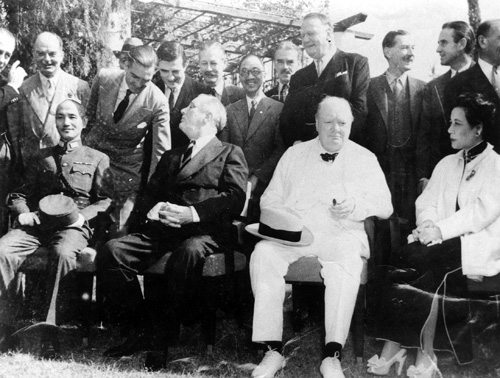|
 |
|
HISTORIC MEETING: Chiang Kai-shek, Franklin D. Roosevelt, Winston Churchill, Chiang Soong May-ling (from left to right, first row) are seated while attending the Cairo Conference held in Cairo, the capital of Egypt, in November of 1943 (CFP) |

On December 1, 1943, at Cairo's Mena House, a restaurant complex near the renowned Giza pyramids, history that changed the political landscape of the Asia-Pacific after World War II was made. After several rounds of discussion, diplomats from China, Britain and the United States drafted the famous Cairo Declaration.
History is a mirror that reflects the difference between evil and justice. And history is also a force that disciplines the world's order and behavior through legal instruments formed after international coordination. The Cairo Declaration is one of the footstones that marked history. It is influential and significant in terms of the state of today's Asia-Pacific issues, settlement of territorial disputes and the post-war international order.
Legal basis
According to the declaration, "Japan shall be stripped of all the islands in the Pacific" it had seized or occupied since the beginning of World War I, and that "all the territories Japan has stolen from the Chinese, such as Manchuria, Formosa (currently Chinese Taiwan), and The Pescadores, shall be restored to the Republic of China."
On September 2 of 1945, Japan specifically accepted the provisions of the Potsdam Declaration, which was issued on July 26 by the United States, Britain and China, and signed the Instrument of Surrender. The Potsdam Declaration reaffirmed that the terms of the Cairo Declaration would be carried out, and stipulated that "Japanese sovereignty shall be limited to the islands of Honshu, Hokkaido, Kyushu, Shikoku and such minor islands as we determine" and its military forces "be completely disarmed."
Recently, Japan attracted worldwide attention by aiming to reverse post-war history. Right-wing Japanese citizens opposed the Cairo Declaration, trying to stress the Treaty of San Francisco, which was signed on September 8, 1951, and which China never had admitted. To today's Shinzo Abe administration, the only way Japan can resume its past glory is to reestablish powerful military strength. The precondition of being armed is to amend its pacifist constitution, which requires a denial of its crimes of aggression. Therefore, distorting and rewriting history has become a political demand in today's Japan.
Unlike the Treaty of San Francisco, which included China's territory but not the Chinese Government's involvement, a substantial proportion of Cairo Declaration's contents were written into the Potsdam Declaration, and had been implemented in the early post-war period through the allied forces' occupation of Japan. The legal coherency of the Cairo Declaration far exceeds that of the Treaty of San Francisco, which China has opposed since its creation. Japan cannot use the latter treaty, which is illegal and one-sided, to oppose the Cairo Declaration if it wishes to remain on a sound international legal foundation.
The Cairo Declaration, Potsdam Declaration, Japan's Instrument of Surrender, Sino-Japanese Joint Statement and China-Japan Peace and Friendship Treaty have proved the illegitimacy of Japan's occupation of Chinese territory, which must be returned to China. Japan used to accept all these historical documents, but today, by denying the Cairo Declaration, Japan is negating the Potsdam Declaration, Japan's Instrument of Surrender, Sino-Japanese Joint Statement and China-Japan Peace and Friendship Treaty. At the same time, Japan's denial of the Cairo Declaration is a disavowal of its peaceful development path after World War II.
Significance
The Cairo Declaration not only decided Japan's future following World War II, but also determined the post-war situation of Eastern Asia.
|
